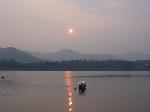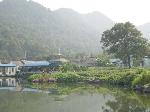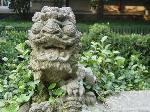- Getting around Lijiang. Dont stay in the Old Towns more than 2 days, there is nothing to do. KRISS Oct 9, 2013 05:46
- 2013 Beijing Temple Fair BENNYLAU Feb 26, 2013 03:29
- Malaysian traveling from KUL - LAX vis Shanghai PVG ZATI_DY Jan 3, 2013 20:15
Silks and Teas
- Views: 3259
- |Vote: 0 0
- |Add to Favorites
- |Recommend to Friends
First Impressions
I rarely take domestic flights within China - the train system is just too economical and far more interesting for China enthusiasts. However, when the responsibility fell to me to escort my mother on a short jaunt around the country, I took the opportunity to book my first national airline, from Dalian city to the reputed paradise of Hangzhou.
People speak of Hangzhou in hushed tones: if the skies have the heavens, it is told, then the Earth has Hangzhou - and its sister city, Suzhou. Whilst Suzhou is famous for its waterways and is called the Venice of China, Hangzhou is known for its West Lake district, pretty walkways reaching across the lake waters teeming with wild lotus, just as they have done for centuries.
I was interested to see how the region would look from the air. Having seen parts of northern China on incoming International flights - wide, dry plains of intensely farmed earth-coloured countryside - I anticipated broad, feverishly green stretches of rice paddies, similar to those I'd seen from the ground on train journeys across Hunan.
What I actually observed of the farmlands around Hangzhou astonished me - for miles, the land was divided into perfect and identical geometric sections, at the centre of which stood what appeared to be little towers; hundreds of obelisks in erratic rows. At the top of the towers, glinting in the daylight, were what appeared to be jewels studded into place, or the flames of candles.
The city bus from the Hangzhou airport clarified the mystery, but left me none the less astonished. Each obelisk was a farmhouse, five stories high, and the great diamonds at the crowns of these extraordinary farmer's homes were glass conservatories built onto the top storey. It was practically science fiction: if these were, as they appeared to be, the homes of peasant farmers, then they had to be the most stylish peasants in the whole country. The farmed sections around the houses were small, and the crops varied from homestead to homestead - making each farm more of a lifestyle patch than a plot of land requiring bitter toil. Hangzhou, it seemed, was already living up to its reputation as a paradise on Earth.
It wasn't long before the airport bus reached Hangzhou proper, and the view of the city was as magnificent as I'd expected. Hangzhou is a marvellous and prosperous city, laying claim to lake views that have been celebrated since ancient times and have inspired poets and artists throughout the ages - and at the same time, possessing thoroughly modern and comfortable city conveniences. My mother relaxed with a latté in Starbucks - a popular American coffee chain found only in the most developed cities in China - while I scoured the inner city streets for an acceptable hotel. Prices around the lake front were prohibitive - as to be expected for such an enviable location - but a short walk back into the streets, a good selection of budget hotels can be booked, most with more than comfortable facilities and certainly close enough to the water to allow easy access to Hangzhou's glorious heritage - the picturesque West Lake. It was already getting late, so we rested early and left exploring the lake region until the morning.
Shopping
I'd been told that Hangzhou is predominantly famous for two thoroughly traditional Chinese products - silk, and tea - and figured that if my mum was going to take home anything special as a souvenir of her time in China, then a sample of both of these products would prove ideal.
Come morning, we ventured into the Hangzhou inner streets and strolled down towards the lake. The weather was superb, and our initial impressions of the West Lake were nothing short of enchantment - however, being right in the middle of summer, the temperature was formidable and we elected to save an exploration of the lake for the late afternoon cool. We flagged down a taxi and asked the driver to take us to the nearest reputable silk store.
The nearest, as it turned out, proved to be as far away as humanly possible without seeming so - correspondingly, we ended up in the carpark of a quiet warehouse directly on the other side of the lake and hidden among the backstreets. The air was especially fragrant as we stepped outside - the fresh aroma of nearby tea plantations.
In the warehouse, we found aisles and aisles of fine garments - scarves, suits, and regular dresses in stylish designs hung alongside more stereotypically Chinese cheongsam dresses and other 'Tang zhuang' - Chinese clothing with high collars and string-clasp buttons. My mother selected nightwear - a slip-on sleeping gown dyed in colourful prints. The saleslady informed my mother that it was almost as comfortable as wearing nothing at all - a comment that could conceivably have lost her the sale - however, suffice it to say that if you've never tried sleeping in silks, it does come highly recommended!
The tea was almost easier to find than the silk. Hangzhou is home to what is generally considered to be China's finest tea - Longjing Green tea - and it's certainly the most popular. The blend has been thought to be top quality since Imperial times when the Emperor Qianlong passed through the city and sampled it. He was so impressed that he declared it to be the imperial tea - the highest accolade of the age. He wasn't mistaken - Hangzhou's warm temperatures, humidity, rich soil and moderate rains make an ideal climate for the growth and production of tea, meaning the end result is about as perfect as tea can get. The tea is sorted into thirteen grades when picked, and the upper echelons sell for quite extraordinary prices - but visitors should be more than satisfied with a good, medium quality selection which can be measured and sold by the tin in most speciality tea stores, where tourists can also pick from a selection of traditional Chinese tea sets. Some stores also hold small performances to introduce customers to the complicated customs of tea drinking, preparation and serving - the so-called Chinese 'tea culture'.
The West Lake
My mother hadn't yet seen a real Chinese temple, and so we decided to make a stop at the Yuefei temple to look around before setting out along the walkways crossing the lake. It is situated right on the shore of the lake, and couldn't have been a better choice for an introduction to traditional Chinese shrines. Built back in 1221, it was constructed in honour of a fervently patriotic general who was executed under false charges. Despite the age of the place, it is in exceptional condition, and has a genuinely peaceful and unworldly atmosphere, with gardens and ponds and a section reserved for the generals tomb - he was reinterred here 20 years after his death. Nearby, the cast figures of those who betrayed him kneel in eternal shame.
After we'd had the chance to relax in the temple grounds, we finally made our way to the lake and began our walk across it. A causeway that was constructed originally to help control flooding long ago in the Tang Dynasty leads south across the lake waters from the Yuefei temple and immediately takes travellers away from the city and into a charming and almost ancient setting - I couldn't have possibly brought my mother anywhere that would have appeared more pleasingly Chinese. Locals were out strolling too, old couples, young men and women cycling home peacefully along the delightful old pathways at the water's edge. A couple had chosen the location to take wedding photos before the veritable carpet of lotus leaves rolling out along the lake's surface.
The walkway takes about half an hour or more to cross, and spans a sequence of elongated man-made islands connected by extraordinary traditionally styled bridges, each adorned with tiny statues of playful lions. Tall willows lined the water's edge, and in the distance other islets set with small pagodas and old buildings were the image of poetry itself. It wasn't hard to see why the lake has been regarded as such a delight for so many centuries - even considering all the landscaping added in modern times, the view of the setting sun behind the elegantly curving mountains providing a backdrop to the lake scenery were almost painfully exquisite. Other visitors to the lake, drifting across it in small boats, broke the sparkling water in the shimmering light of the setting sun, floating slowly away towards the opposite shore.
As we walked towards the end of the walkway, I reflected on the common claim that Hangzhou is a paradise on Earth. Whilst the modern city areas are themselves relatively standard as far as Chinese metropolises go, the natural scenery around the lake and in the outer regions is so superb that it's a city that's hard to forget. My mother, since leaving China, has always described the place as a highlight of her travels, and I anticipate taking her back the next time she visits me here in China.






 Copyright © 1998-2026 All rights reserved.
Copyright © 1998-2026 All rights reserved.